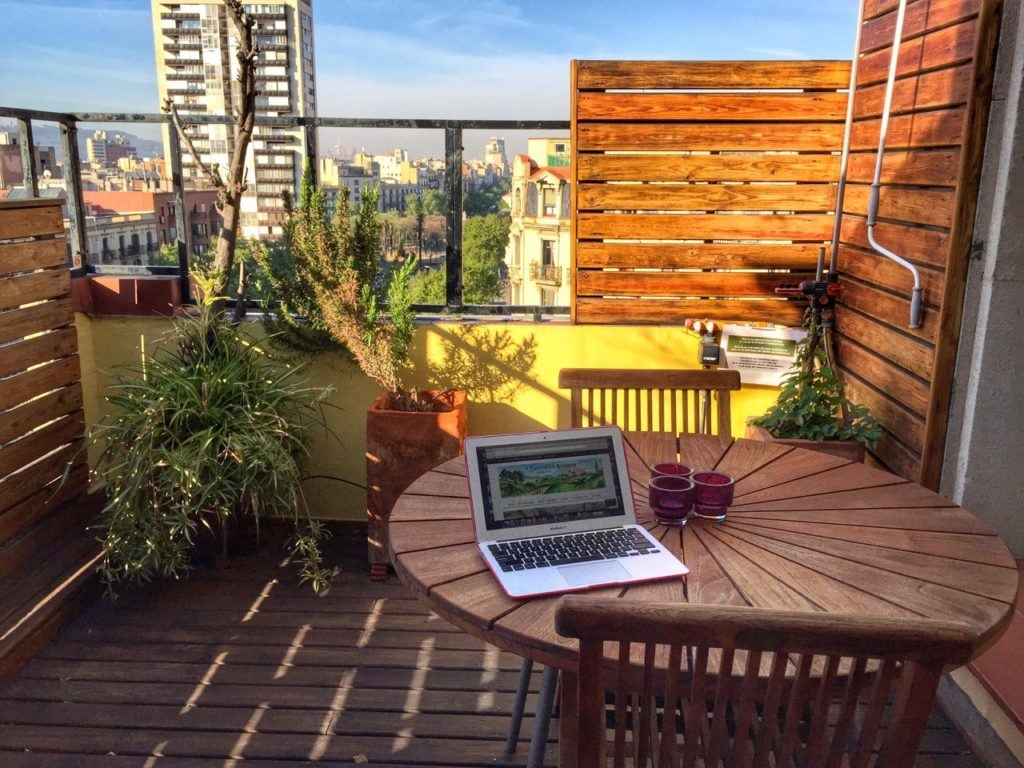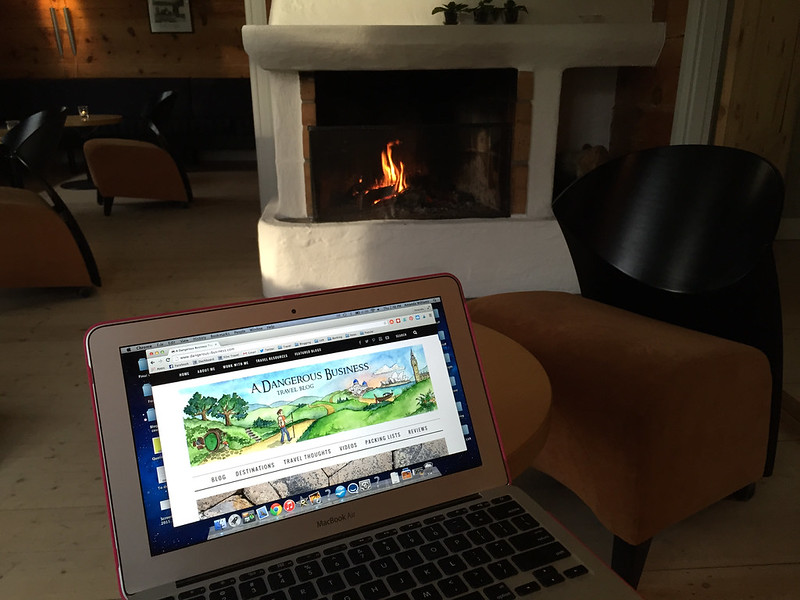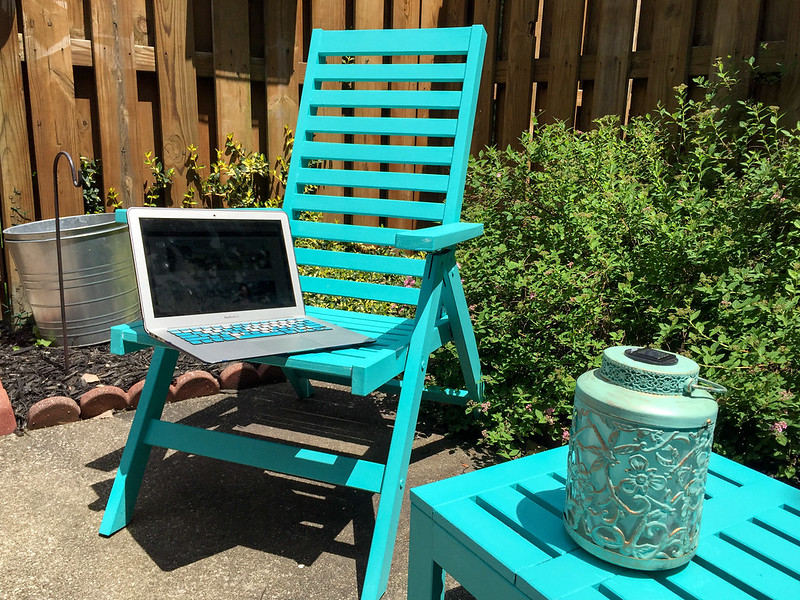What Working Remotely is Really Like + 7 Tips for Working From Home
Stopping by because you're now working from home for the first time thanks to the COVID-19 coronavirus? Check out the realities of working remotely, and scroll further down for my top tips for staying productive when you're working from home!
You've seen the photos – someone working on a laptop in a hammock, or on a beach, or on a hotel balcony with a killer view (yup, I'm guilty of this last one!).
You see these photos and assume that it's not a lifestyle that you could have for yourself; this is surely the lifestyle of someone with more freedom and less responsibility than you.
But what if I told you that wasn't necessarily true?
Twenty years ago, the concept of “remote work” wasn't even really a thing. People went to an office or out into the field to do their jobs. Hardly anyone worked from home. And, checking in for daily meetings from some remote corner of the world? Unheard of.

But, now, with the proliferation of the internet, many more jobs can be done outside the typical office environment than ever before. Telecommuting has been called “the future of work,” and the growth in remote work has been almost exponential (it's increased by 44% in the last 5 years alone).
So some curiosity about what “working remotely” really means is natural.
The Realities of Working Remotely
In some cases, a person might be able to work remotely (or from home) a couple times per month, or maybe even one or two days per week. That IS remote work – but not necessarily the type of telecommuting I want to talk about here. I want to tell you what working 100% remote is really like. What it's like to be “location independent” and make a living from wherever you happen to be in the world.

First of all, there are a couple different kinds of “remote work.”
- Freelancing – When you're a freelancer, it usually means that you're hired for projects – sometimes one-off, sometimes on an ongoing basis – and your workload and salary can vary greatly month to month. For example, I used to freelance frequently as a writer for a few different travel websites, but would also pick up one-off writing or social media gigs when I could get them.
- Contract work – When you're working on a contract, it means you can count on a certain amount of work for a set period of time. For example, when I was working for a software startup back in 2014/15, I was on a contract to work at least 20 hours per week. There's still usually some freedom with contract work when it comes to how/when you put in your hours, but it's generally steadier than straight-up freelance work.
- Full-time work-from-home – This type of remote work is more regimented; more like a full-time job. You have set work hours every day – you're just doing that work from your home rather than a traditional office.
These days, I'm a full-time blogger. While I used to focus on freelance and contract work, I have even more freedom now because my blog itself makes me a full-time income. This means I can take on as much (or as little) work as I want, based on what my travel plans look like.
And while I do have a home base in Ohio, I could conceivably be traveling full-time or living abroad and still be able to do what I do.

What kind of things can you do remotely, you ask? Well, things like:
- Writing
- Editing
- Transcribing
- Social media management
- Customer service
- Web/graphic design
- Content/email marketing
- Coaching/consulting
- Project management
Basically any job that you can do 100% from a laptop is something that can be done remotely.
Why working remotely is awesome
If working remotely sounds pretty great so far, that's probably because it is! Or, at least it can be. Having a location-independent lifestyle is great for many reasons.

For example:
1. You can make your own hours
Especially when you're a freelancer working remotely, you often have the freedom to set your own working hours. Not a morning person? No problem – start your work day at noon and work into the evening. Want to take the afternoon off to go to the beach or to a museum? You can do that, too.
As a blogger, my work load varies from week to week (and sometimes from day to day!). By planning ahead, I can often fit the bulk of my work into a few days if I know I want to dedicate some time to something else at some point during the week.
Even when I was working on a contract, I could usually plan my work around my schedule – even when I was traveling.
2. You can work from anywhere
The biggest upside to location independence and working remotely is, of course, the freedom to work from anywhere you want. All you really need is a laptop and a decent wifi connection.
I base myself out of Ohio, and therefore spend a lot of time working from my home (I like to joke about my daily “commute” from the bedroom to the living room or office). But when I travel, I usually take my work with me.
I've worked from balconies in Spain, terraces in the Greek Islands, cafes in New Zealand, the beach in Thailand, and while nestled up by the fire in Norway. The freedom to work AND travel is paramount to a travel blogger like me, but is a bonus to other types of remote workers, too.

Why remote work is challenging
Even though the freedom to work from anywhere and set your own hours is appealing, working remotely (especially as a freelancer) doesn't come without its challenges.
1. Self-accountability
When you're a freelancer or a contractor, it often means that you are your own boss. Sure, you might be hired to do specific work for a specific client and given a deadline, but it's ultimately up to YOU (and no one else) to make sure the work gets done on time.
There's a lot of self-accountability involved with working remotely, since you don't have a boss or coworkers around to keep tabs on you.
2. More distractions
Working from a co-working space is probably the best idea for most remote workers since it acts like your “office” – however it's not always feasible to pay for a desk somewhere. If you travel a lot like me, it's easier to work from home or from wherever you are on the road.
But the freedom to work from anywhere also comes with distractions. At home, there's always the TV, my cat, and every social media site out there tempting me into distraction. When I'm traveling, there's of course always the pull to be out exploring instead of working. If you're working remotely, you'll have to learn how to deal with the distractions in a way that still allows you to be productive.

3. You may not always have a steady paycheck
One of the biggest challenges for me as a blogger/freelancer is never knowing exactly how much money I'll be making each month. I often have to hustle for work, and the uncertainty of it all has seriously stressed me out in the past. This is minimized if you take on more contract work, or if you do your “normal” job from home, of course. But it's still something to think about.
I've worked hard in the past few years, though, to diversify my income streams so that I'm not relying on one job for all of my income. But diversifying takes time, and until you hit the perfect balance you may not have a steady paycheck to rely on each month.
RELATED: How I Make Money as a Blogger
4. It can be hard to stop working
Lastly, another huge challenge that I face while working remotely is striking a balance between work and play. It's easier when I'm traveling, since exploring a new destination trumps sitting in front of a laptop just about any day. But when I'm at home, I struggle. I tend to work better in the afternoons/evenings, but this means that I'm often opening up my laptop when a new work idea strikes me well into the night.
It's something I don't usually think twice about since I LOVE what I do, but I do realize that I don't have the healthiest work/life balance. Some days I literally have to force myself to close my laptop and put away my phone and do something that doesn't have anything to do with work. This is something I'm constantly working on!

Is remote work worth it?
I've talked to plenty of people who don't think working remotely or being a freelancer would be a good fit for them. And that's totally fair – being your own boss, setting your own hours, and dealing with salary uncertainty isn't for everyone. There are also some days where I definitely do miss having coworkers and friends in an office, too.
But, at the end of the day, this type of lifestyle IS for me. I love being able to plan a trip whenever I want, and I love that I can write a blog post or manage a social media account from the other side of the globe.
Even though the challenges seem… well, challenging, the pros of working remotely far outweigh the cons in my eyes.
7 tips for working from home
Whether you're new to remote work or an old hand at it, you still need to treat it like work – meaning you need to know what you need to do in order to stay as productive as possible.
Here are my top tips for working from home that will help you be both comfortable and productive!
1. Know your work style
If you know you work best in the afternoons instead of the mornings, don't fight it. This is the case for me, so I usually spend my mornings doing things like handling my email inbox and checking on social media. I save the real “work” (in my case, writing and editing) for the afternoon.
If you know you need a standardized routine in order to get things done, work on establishing one that can be adapted no matter where you'll be working from. (And if you're switching from working in a regular office setting to working at home, try to replicate your usual office routine as you ease into remote work.)
2. Stay organized
Whether you have a boss to answer to or run a one-person show like I do, staying organized and on top of your to-do list is so incredibly important. I stay best organized when I can make lists and set deadlines, and then hold myself accountable to them.
My favorite apps for keeping track of tasks include CoSchedule (for my editorial calendar), Trello, and my Google Calendar. Other good organizational tools to check out include Todoist and Notion.
3. Create an ideal work environment
Because I've been doing this for a while, I can essentially work anywhere that has good wifi. But obviously things like a comfortable place to sit and some natural light help, too. Make sure your work environment works for you, whether your necessities are as simple as a couch and a laptop, or as complex as multiple monitors and ergonomic gadgets.

4. Know how to handle distractions
There are plenty of handy apps out these these days to help you stay focused. My friend Kate introduced me to the Be Focused app, a free app for Mac that helps you work in 25-minute increments of time. Other apps that help you keep track of your time include RescueTime and Toggl.
5. Set goals
Whether these are daily, weekly, quarterly, or yearly, goal-setting is super important for remote workers – especially if you're also running your own business and not just working for someone else.
In my line of work, I set loose goals for things like traffic, income, and even how many blog posts I want to publish every month. (And a bonus tip: Celebrate reaching said goals!)
6. Know when to stop
It's easy to get wrapped up in work when you don't have set hours or anybody to answer to on a daily basis. Because of this, it's extra important to know when to set the laptop aside. If it helps, set yourself actual working hours every day with established break times so you can get into a routine
(And yes, you should absolutely work in regular breaks, even when you're working from home.)
7. Learn how to say no
As a freelancer especially, many people will expect a lot from you. Often all at once. When I first started working remotely, I would jump at literally any chance to make extra money. But that's how you get burnt out as a freelancer. When working for yourself, you HAVE to learn how to say no, for both your mental and physical well-being.
So what's your take on working remotely? Is it something you'd ever want to do?
Pin it for later:


Comments
Post a Comment